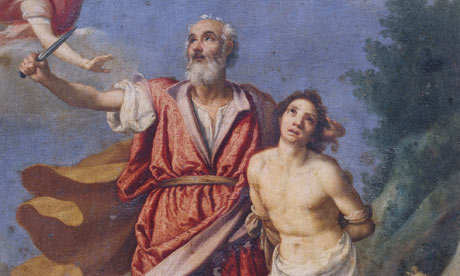
The story of how Abraham, in obedience to a direct command from God, almost sacrificed his only son, Isaac, is one of the most perfectly written short narratives in the Old Testament. This is the story that Wilfred Owen retells and revises in this week's poem, The Parable of the Old Man and the Young.
Owen, you'll notice, keeps close to the language of the King James Authorised Version. He also restrains himself rhythmically, conforming to the trudge of iambic pentameter. We like our war poetry, whether by Homer or Owen, to convey authenticity and guarantee its integrity by raw images and rough-hewn reportage. Owen can give us raw and rough-hewn, but in this poem he stands back from his subject matter: he is here to preach. And his matter is serious and specific enough to justify that technique.
It's not until the imagery of "fire and iron" (Abraham's implements were simply fire, wood and a knife) that we see the parable to be constructed. Owen's modernising tactics become increasingly clear. The Old Testament Isaac was simply "bound" to the pyre, but here we have "straps and belts", and then, unmistakably, "parapets and trenches".
These details are almost incidental. Staying true to the original plot, Owen continues with the angel's stay of execution. His angel-with-a-small-A might symbolise conscience or wisdom, but Owen doesn't nudge the reader to any such interpretation. He is explicit about the symbolism of the ram, however: it is the Ram of Pride (note the capital letters).
The poem's 16 lines are largely in blank verse, but with some characteristic para-rhyme, most obvious in lines four and five ("together/father"). "Son" is twice used as an end word. Initially, it hints at a rhyme with "heaven". In the final couplet, paired with "one", it sounds the first full rhyme of the poem. The phrase "one by one" emphasises how mass slaughter is made up of individual deaths. The parallelism between "to slay his son" and "but slew his son" underscores the dull obduracy of the old man. In spite of its irregular sound pattern, the poem maintains an inevitable narrative flow, and a tone and vocabulary always in keeping with the original text.
Owen sent this poem in the summer of 1918 to Osbert Sitwell, and it's more than likely he was responding to Sitwell's own poem The Modern Abraham. This is a satire whose style calls to mind Siegfried Sassoon. It turns Abraham into a wealthy arms-manufacturer, whose "purple fingers clutch a large cigar". Already, one son has been killed, and Abraham says he would gladly send 10 more off to fight. The portrait is a rather unlikely caricature with, for the modern reader, seemingly antisemitic overtones – a taint Owen's more universal parable completely avoids.
Owen's poetic subject, as his famous preface said, was "the pity of War". He is concerned, too, with its bitter irony. How much less it would have cost the leader of his people had he slaughtered a single Ram of Pride instead of millions of young men "one by one". The poem reveals the sheer ridiculousness of arrogant militarism. The Genesis story has no such moral. It ends with the Angel promising Abraham that his seed, multiplying like stars and sand grains, will "possess the gates of his enemies". Its subject is the nation's dream of victory; not the pity of war but its deceptive glory.
Owen's poem chimes for me with Barack Obama's recent speech in Cairo, in which the command of conscience is to kill the ram of violent extremism. Obama's fundamental subject, too, I think, is "the pity of War". Commenting on the speech in the Evening Standard, William Dalrymple concluded: "Certainly if anyone can drain the deep reservoir of hurt, hatred and suspicion dividing the children of Abraham, it is he." An acknowledged legislator who can think in the nuanced manner of a great war-poet? Good heavens!
The Parable of the Old Man and the Young
So Abram rose, and clave the wood, and went,
And took the fire with him, and a knife.
And as they sojourned both of them together,
Isaac the first-born spake and said, My Father,
Behold the preparations, fire and iron,
But where the lamb for this burnt offering?
Then Abram bound the youth with belts and straps,
And builded parapets and trenches there,
And stretched forth the knife to slay his son.
When lo! an angel called him out of heaven,
Saying, Lay not thy hand upon the lad,
Neither do anything to him. Behold,
A ram, caught in the thicket by its horns;
Offer the Ram of Pride instead of him.
But the old man would not so, but slew his son,
And half the seed of Europe, one by one.

